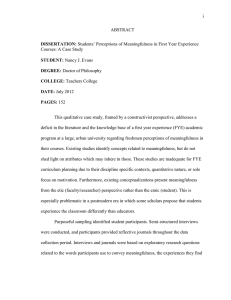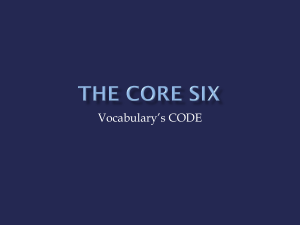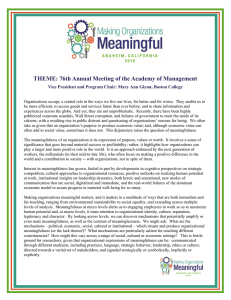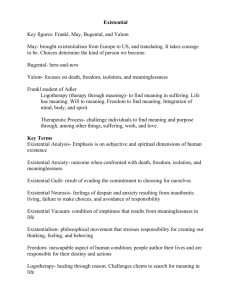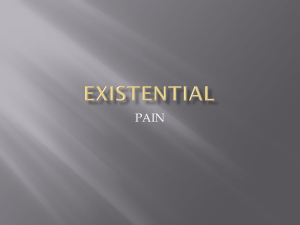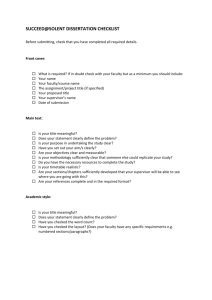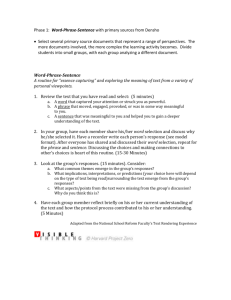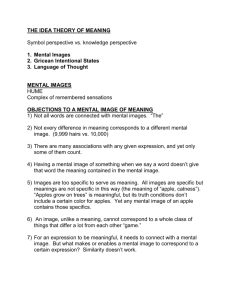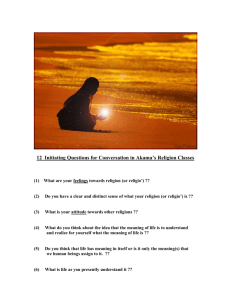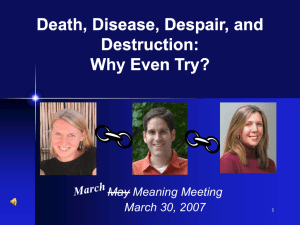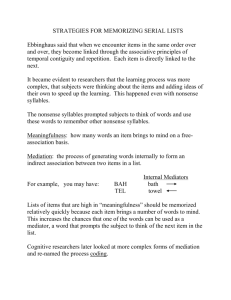The meaning of work - University of Warwick
advertisement
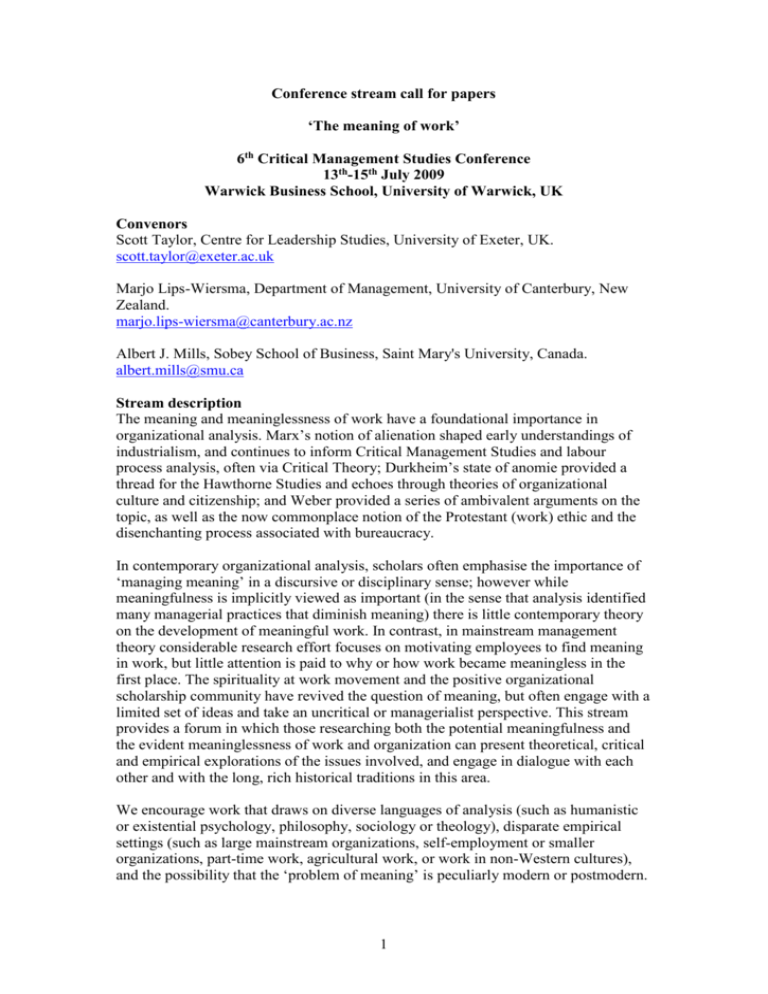
Conference stream call for papers ‘The meaning of work’ 6th Critical Management Studies Conference 13th-15th July 2009 Warwick Business School, University of Warwick, UK Convenors Scott Taylor, Centre for Leadership Studies, University of Exeter, UK. scott.taylor@exeter.ac.uk Marjo Lips-Wiersma, Department of Management, University of Canterbury, New Zealand. marjo.lips-wiersma@canterbury.ac.nz Albert J. Mills, Sobey School of Business, Saint Mary's University, Canada. albert.mills@smu.ca Stream description The meaning and meaninglessness of work have a foundational importance in organizational analysis. Marx’s notion of alienation shaped early understandings of industrialism, and continues to inform Critical Management Studies and labour process analysis, often via Critical Theory; Durkheim’s state of anomie provided a thread for the Hawthorne Studies and echoes through theories of organizational culture and citizenship; and Weber provided a series of ambivalent arguments on the topic, as well as the now commonplace notion of the Protestant (work) ethic and the disenchanting process associated with bureaucracy. In contemporary organizational analysis, scholars often emphasise the importance of ‘managing meaning’ in a discursive or disciplinary sense; however while meaningfulness is implicitly viewed as important (in the sense that analysis identified many managerial practices that diminish meaning) there is little contemporary theory on the development of meaningful work. In contrast, in mainstream management theory considerable research effort focuses on motivating employees to find meaning in work, but little attention is paid to why or how work became meaningless in the first place. The spirituality at work movement and the positive organizational scholarship community have revived the question of meaning, but often engage with a limited set of ideas and take an uncritical or managerialist perspective. This stream provides a forum in which those researching both the potential meaningfulness and the evident meaninglessness of work and organization can present theoretical, critical and empirical explorations of the issues involved, and engage in dialogue with each other and with the long, rich historical traditions in this area. We encourage work that draws on diverse languages of analysis (such as humanistic or existential psychology, philosophy, sociology or theology), disparate empirical settings (such as large mainstream organizations, self-employment or smaller organizations, part-time work, agricultural work, or work in non-Western cultures), and the possibility that the ‘problem of meaning’ is peculiarly modern or postmodern. 1 Examples of areas that might be addressed include (but are not limited to): Humanistic and existential psychology: the mark of true meaning as personal discovery and free choice rather than prescription and domination. In Work, Death and Life Itself Burkard Sievers argues that ‘motivation as a surrogate for meaning allows one to substitute any holistic awareness and relatedness of the individual by a trigger, which can be easily pressed or stroked – whatever seems to be more successful in making people perform according to other people’s expectations’. Similarly, others suggest that contemporary capitalism encourages us to find meaning in ‘peak experiences’ or sensation seeking, rather than collective cultural or identity formations. We therefore invite papers that describe the extent to which current motivational contexts enhance or distract from meaningful work, and the role of consumption in constructing work as meaningful. Philosophy: discussion of ethics often confronts us with the meaning of life or questions of how we are to live. Here we may be faced with debate as to the ultimate purpose of life. Meaningfulness on a day-to-day basis may be lived through a set of principles brought into practice, such as compassion, honesty, caring and loyalty, that translate into ‘acts of meaning’ and consciousness of the existential significance of such actions. We invite papers that describe the extent to which current ethical theory and practice might enhance or distract from the construction and pursuit of meaningful work. Sociology: meaningful work is often referred to as just and dignified work; debate over morality and meaning in workplaces most often begins with arguments over whether work is essentially degrading or enabling. Analysis may concentrate on ‘just rewards’ for work, or the ability to choose between work and other commitments, or perhaps freedom to resist and oppose the discourse of meaningful work. We invite papers that explore these dynamics, or the degree to which contemporary management theory and practice enhance or distract from just and dignified work. Religion and spirituality at work: meaning may be seen as either unconditional or conditional. If unconditional, meaningfulness is based on the notion that having any is what matters. Conversely meaning may be conditional (or existential) in being concerned with questions about the meaning of life and death, the ontological significance of life, or purpose in physical existence. However if we follow this we may find that meaning becomes another word for almost every human experience which is perceived to be pleasurable, right or true to the individual. Thus it seems important to distinguish between meaning that is unconditional, in that it serves ‘ultimate concern’, and conditional meaning, which may serve what Paul Tillich called ‘false gods’. We therefore invite papers that examine the construction of conditional or unconditional meaning at work, informed by religious or spiritual belief/practice. Although we expect this stream to be a conversation across and between disciplines or perspectives, we also expect analyses to respond to the conference ethos of critique. Abstracts to be submitted initially to Scott Taylor (scott.taylor@exeter.ac.uk); we would also like to encourage other forms of engagement such as round-table discussions. Abstracts and proposals must be received by 1st November 2008, maximum 1,000 words, single spaced in 12 point font; full papers will be required by 1st May 2009. See http://www2.warwick.ac.uk/fac/soc/wbs/conf/cms2009/ for more details. 2
